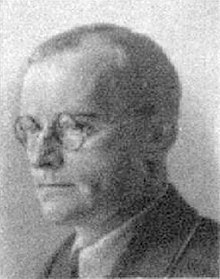Walther Schulze changes

Walther Schulze-Wechsungen (born November 18, 1902 in Nordhausen ; † 1944 ) was a German politician ( NSDAP ).
Live and act
After attending humanistic grammar schools in Nordhausen and Berlin, Schulze-Wechsel took part in the German-Polish border fighting that broke out after the end of the First World War, in which he was wounded. After his recovery he studied philosophy in Jena .
In 1920 Schulze-Wechsel took part in the Kapp Putsch , in which he was seriously wounded. According to his own statements, he was captured by a “red army” (probably referring to the Red Ruhr Army ) and sentenced to death. However, he survived as he was freed by government troops before the sentence was carried out. He then stayed in Western Pomerania for three years. He later studied in Göttingen .
In the spring of 1930, Schulze-Wechsel joined the NSDAP. The SA had already joined the 1929th At that time he was earning his living as the commercial manager of a Berlin factory. In 1932 he gave up this position in order to devote himself fully to party work. As a result, he was entrusted, among other things, with the office of Gau propaganda leader in Gau-Berlin .
After the " seizure of power " by the National Socialists in the spring of 1933, Schulze-Wechsungen was appointed head of state propaganda in the Reich Ministry for Public Enlightenment and Propaganda . In parallel to this task he took on a mandate in the Prussian state parliament in 1933 , to which he belonged until this body was dissolved in October 1933. In November 1933 he was instead given a mandate for the Reichstag , in which until January 28, 1936 - when his mandate was declared invalid - he represented constituency 3 (Potsdam II). The loss of Schulze-Wechsungen's mandate in the Reichstag - as well as all of his other offices - was due to allegations of corruption.
literature
- Joachim Lilla , Martin Döring, Andreas Schulz: extras in uniform. The members of the Reichstag 1933–1945. A biographical manual. Including the ethnic and National Socialist members of the Reichstag from May 1924. Droste, Düsseldorf 2004, ISBN 3-7700-5254-4 .
- Erich Stockhorst: 5000 people. Who was what in the 3rd Reich . Arndt, Kiel 2000, ISBN 3-88741-116-1 (unchanged reprint of the first edition from 1967).
Individual evidence
- ↑ “The Nazis staged the transfer of the six prominent men as a major media event ... The newcomers had to dress in rags and have their hair shaved. In the subsequent roll call, the Standartenführer Schulze-Wechsungen vilified the six celebrities in the worst possible way in front of all inmates. ” Stiftung-bg
Web links
- Literature by and about Walther Schulze changes in the catalog of the German National Library
- Walther Schulze changes in the database of members of the Reichstag
| personal data | |
|---|---|
| SURNAME | Schulze changes, Walther |
| BRIEF DESCRIPTION | German politician (NSDAP), MdR, MdL |
| DATE OF BIRTH | November 18, 1902 |
| PLACE OF BIRTH | Nordhausen |
| DATE OF DEATH | 1944 |
